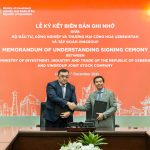Economy
FMDQ Commercial Paper Market Hits N12.3tr

By Dipo Olowookere
Following an extended period marked by a dearth of activity, significantly weakened issuer interest and diminished investor confidence, the Nigerian Commercial Paper (CP) market may now have accomplished a full and clear revival as registered CP Programmes on the platform of FMDQ OTC Securities Exchange (FMDQ or the OTC Exchange) have crossed N1 trillion in value.
Stark opacity and extreme market irregularities which characterised the Nigerian CP market prior to the necessary release of the Central Bank of Nigeria (CBN) Guidelines on the Issuance and Treatment of Bankers’ Acceptances and Commercial Paper [2009] (the Guidelines), saw the sharp decline of the then market from trillions worth to zero levels by 2013.
There however, appears to be hope for businesses looking to tap the debt market for short-term capital and investors looking to diversify their portfolios, as the FMDQ-championed CP market reform since 2014, which was predicated on the back of the CBN Guidelines, has contributed, in no small measure, to the revival of the activities in the CP market; providing issuers a renewed opportunity to grow their businesses and meet short-term funding obligations as well as restoring the much-needed confidence required by investors to actively participate in the market.
Having made the decision to embark on key initiatives and strategies for the restoration of the Nigerian CP market back in 2014, FMDQ, in collaboration with the CBN and other relevant market stakeholders, relentlessly sought to realise this objective.
FMDQ released the FMDQ Commercial Paper Quotation Rules & Process in 2014, following the receipt of the CBN’s “No Objection” on same, and focused efforts and the requisite resources to organise and resuscitate the undeniably extremely important market.
In addition to providing what issuers and market participants have described as a reliable and efficient platform for registering, quoting and trading CPs, amongst other debt securities, FMDQ has taken the most crucial steps towards promoting transparency, governance, integrity and efficiency, thereby regaining the lost interest and confidence in the Nigerian CP market, by adopting initiatives specifically targeted at achieving the objective to revive the market.
Transparency, price discovery, liquidity, rollover governance (i.e. matured CPs are approved for rollover only with the consent of investors), efficient quotation processes are some of the transformation elements now evident in the Nigerian CP market today. Issuers and investors alike, are now able to effectively and sustainably contribute to the development of the nation’s debt markets.
Coming at a time when the OTC Exchange has recently affirmed its commitment towards the development of the Nigerian debt capital markets (DCM) and its subsequent deepening and integration to its international counterparts, one can expect that the successes recorded by the Nigerian CP market can be cascaded into other aspects of the Nigerian financial markets within FMDQ’s purview.
Indeed, FMDQ continues to validate its position as the foremost debt capital and OTC derivatives-focused exchange in the nation and the commendable strides made by the OTC Exchange in its product and market development agenda, notable of which include the launch of Short-Term Bonds process to enhance speed to market in bond issuance, the commencement of the Private Companies’ Bonds Noting Service and most recently, and the embarkment on initiatives aimed at the development of the Sukuk and Green Bonds/Sustainable Finance markets to support infrastructure and economic development in Nigeria, have begun to put the Nigerian DCM on the global map.
FMDQ has ably embraced the role of a change agent in the Nigerian financial market and it is expected that the OTC Exchange will not rest on it oars but continue to deploy initiatives to improve the prosperity of all categories of capital raising, investing and trading stakeholders – governments, businesses, and individuals – through its compelling activities in promoting access to capital, democratising investment, enhancing transfer of value and championing transfer of risk in the DCM.
CPs, which are short-term debt financing instruments issued for a period not exceeding two hundred and seventy (270) days, present a cost-effective and stable means of sourcing scarce capital when compared to traditional bank loans and enable businesses diversify their funding sources.
It is therefore, commendable that at such time when banks, non-bank financial institutions and small & medium-scale enterprises are striving to flourish despite the economic challenges in the country, the CP market can be looked to, to provide a viable, stable and cost-effective means for the achievement of their business objectives/goals.
In addition, by accessing the CP market, businesses can build confidence in their brand as well as raise their corporate profiles ahead of tapping the market for longer-term debt such as bonds in preparation for the impact of banks implementation of Basel 3 liquidity management principles.
As an investible asset class, CPs are often sought by investors to diversify their portfolios, thus, enhancing overall portfolio return, with their short-term nature permitting high relative return on investment, and allowing these investors to remain relatively liquid. Companies that have tapped the CP market have achieved significant reduction in their borrowing costs.
Economy
LCCI Raises Eyebrow Over N15.52trn Debt Servicing Plan in 2026 Budget

By Adedapo Adesanya
The Lagos Chamber of Commerce and Industry (LCCI) has noted that the N15.52 trillion allocation to debt servicing in the 2026 budget remains a significant fiscal burden.
LCCI Director-General, Mrs Chinyere Almona, said this on Tuesday in Lagos via a statement in reaction to the nation’s 2026 budget of N58.18 trillion, hinging the success of the 2026 budget on execution discipline, capital efficiency, and sustained support for productive sectors.
She noted that the budget was a timely shift from macroeconomic stabilisation to growth acceleration, reflecting growing confidence in the economy.
She lauded its emphasis on production-oriented spending, with capital expenditure of N26.08 trillion, representing 45 per cent of total outlays, and significantly outweighing non-debt recurrent expenditure of N15.25 trillion.
According to Mrs Almona, this composition supports infrastructure development, industrial expansion, and productivity growth.
However, she explained that the N15.52 trillion allocation to debt servicing underscored the need for stricter borrowing discipline, enhanced revenue efficiency, and expanded public-private partnerships to safeguard investments that promote growth.
She added that a further review of the 2026 budget revealed relatively optimistic macroeconomic assumptions that may pose fiscal risks.
“The oil price benchmark of $64.85 per barrel, although lower than the $75.00 benchmark in the 2025 budget, appears optimistic when compared with the 2025 average price of about $69.60 per barrel and current prices around $60 per barrel.
“This raises downside risks to oil revenue, especially since 35.6 per cent of the total projected revenue is expected to come from oil receipts.
“Similarly, the oil production benchmark of 1.84 million barrels per day is significantly higher than the current level of approximately 1.49 million barrels per day.
“Achieving this may be challenging without substantial improvements in security, infrastructure integrity, and sector investment,” she said.
Mrs Almona said the exchange rate assumption of N1,512 to the Dollar, compared with N1,500 in the 2025 budget and about N1,446 per Dollar at the end of November, suggests expectations of a mild depreciation.
She said while this may support Naira-denominated revenue, it also increases the cost of imports, debt servicing, and inflation management, with broader macroeconomic implications.
The LCCI DG added that the inflation projection of 16.5 per cent in 2026, up from 15.8 per cent in the 2025 budget and a current rate of about 14.45 per cent, appeared optimistic, particularly in a pre-election year.
She also expressed concern about Nigeria’s historically weak budget implementation capacity, likely to be further strained by the combined operation of multiple budget cycles within a single year.
Looking ahead, Mrs Almona identified agriculture and agro-processing, manufacturing, infrastructure, energy, and human capital development as key drivers of growth in 2026.
She said that unlocking these sectors would require decisive execution—scaling irrigation and agro-value chains, reducing power and logistics costs for manufacturers, and aligning education and skills development with private-sector needs.
The LCCI head stressed the need to resolve issues surrounding the Naira for crude, increase the supply of oil to local refineries to boost local refining capacity and conserve the substantial foreign exchange used for fuel imports.
“Overall, the 2026 Budget presents a credible opportunity for Nigeria to transition from recovery to expansion.
“Its success will depend less on the size of allocations and more on execution discipline, capital efficiency, and sustained support for productive sectors.
Economy
Customs Street Chalks up 0.12% on Santa Claus Rally

By Dipo Olowookere
The Nigerian Exchange (NGX) Limited witnessed Santa Claus rally on Wednesday after it closed higher by 0.12 per cent.
Strong demand for Nigerian stocks lifted the All-Share Index (ASI) by 185.70 points during the pre-Christmas trading session to 153,539.83 points from 153,354.13 points.
In the same vein, the market capitalisation expanded at midweek by N118 billion to N97.890 trillion from the preceding day’s N97.772 trillion.
Investor sentiment on Customs Street remained bullish after closing with 36 appreciating equities and 22 depreciating equities, indicating a positive market breadth index.
Guinness Nigeria chalked up 9.98 per cent to trade at N318.60, Austin Laz improved by 9.97 per cent to N3.20, International Breweries expanded by 9.85 per cent to N14.50, Transcorp Hotels rose by 9.83 per cent to N170.90, and Aluminium Extrusion grew by 9.73 per cent to N16.35.
On the flip side, Legend Internet lost 9.26 per cent to close at N4.90, AXA Mansard shrank by 7.14 per cent to N13.00, Jaiz Bank declined by 5.45 per cent to N4.51, MTN Nigeria weakened by 5.21 per cent to N504.00, and NEM Insurance crashed by 4.74 per cent to N24.10.
Yesterday, a total of 1.8 billion shares valued at N30.1 billion exchanged hands in 19,372 deals versus the 677.4 billion shares worth N20.8 billion traded in 27,589 deals in the previous session, implying a slump in the number of deals by 29.78 per cent, and a surge in the trading volume and value by 165.72 per cent and 44.71 per cent apiece.
Abbey Mortgage Bank was the most active equity for the day after it sold 1.1 billion units worth N7.1 billion, Sterling Holdings traded 127.1 million units valued at N895.9 million, Custodian Investment exchanged 115.0 million units for N4.5 billion, First Holdco transacted 40.9 million units valued at N2.2 billion, and Access Holdings traded 38.2 million units worth N783.3 million.
Economy
Yuletide: Rite Foods Reiterates Commitment to Quality, Innovation

By Adedapo Adesanya
Nigerian food and beverage company, Rite Foods Limited, has extended warm Yuletide greetings to Nigerians as families and communities worldwide come together to celebrate the Christmas season and usher in a new year filled with hope and renewed possibilities.
In a statement, Rite Foods encouraged consumers to savour these special occasions with its wide range of quality brands, including the 13 variants of Bigi Carbonated Soft Drinks, premium Bigi Table Water, Sosa Fruit Drink in its refreshing flavours, the Fearless Energy Drink, and its tasty sausage rolls — all produced in a world-class facility with modern technology and global best practices.
Speaking on the season, the Managing Director of Rite Foods Limited, Mr Seleem Adegunwa, said the company remains deeply committed to enriching the lives of consumers beyond refreshment. According to him, the Yuletide period underscores the values of generosity, unity, and gratitude, which resonate strongly with the company’s philosophy.
“Christmas is a season that reminds us of the importance of giving, togetherness, and gratitude. At Rite Foods, we are thankful for the continued trust of Nigerians in our brands. This season strengthens our resolve to consistently deliver quality products that bring joy to everyday moments while contributing positively to society,” Mr Adegunwa stated.
He noted that the company’s steady progress in brand acceptance, operational excellence, and responsible business practices reflects a culture of continuous improvement, innovation, and responsiveness to consumer needs. These efforts, he said, have further strengthened Rite Foods’ position as a proudly Nigerian brand with growing relevance and impact across the country.
Mr Adegunwa reaffirmed that Rite Foods will continue to invest in research and development, efficient production processes, and initiatives that support communities, while maintaining quality standards across its product portfolio.
“As the year comes to a close, Rite Foods Limited wishes Nigerians a joyful Christmas celebration and a prosperous New Year filled with peace, progress, and shared success.”
-

 Feature/OPED6 years ago
Feature/OPED6 years agoDavos was Different this year
-
Travel/Tourism9 years ago
Lagos Seals Western Lodge Hotel In Ikorodu
-

 Showbiz3 years ago
Showbiz3 years agoEstranged Lover Releases Videos of Empress Njamah Bathing
-

 Banking8 years ago
Banking8 years agoSort Codes of GTBank Branches in Nigeria
-

 Economy3 years ago
Economy3 years agoSubsidy Removal: CNG at N130 Per Litre Cheaper Than Petrol—IPMAN
-

 Banking3 years ago
Banking3 years agoFirst Bank Announces Planned Downtime
-

 Banking3 years ago
Banking3 years agoSort Codes of UBA Branches in Nigeria
-

 Sports3 years ago
Sports3 years agoHighest Paid Nigerian Footballer – How Much Do Nigerian Footballers Earn












